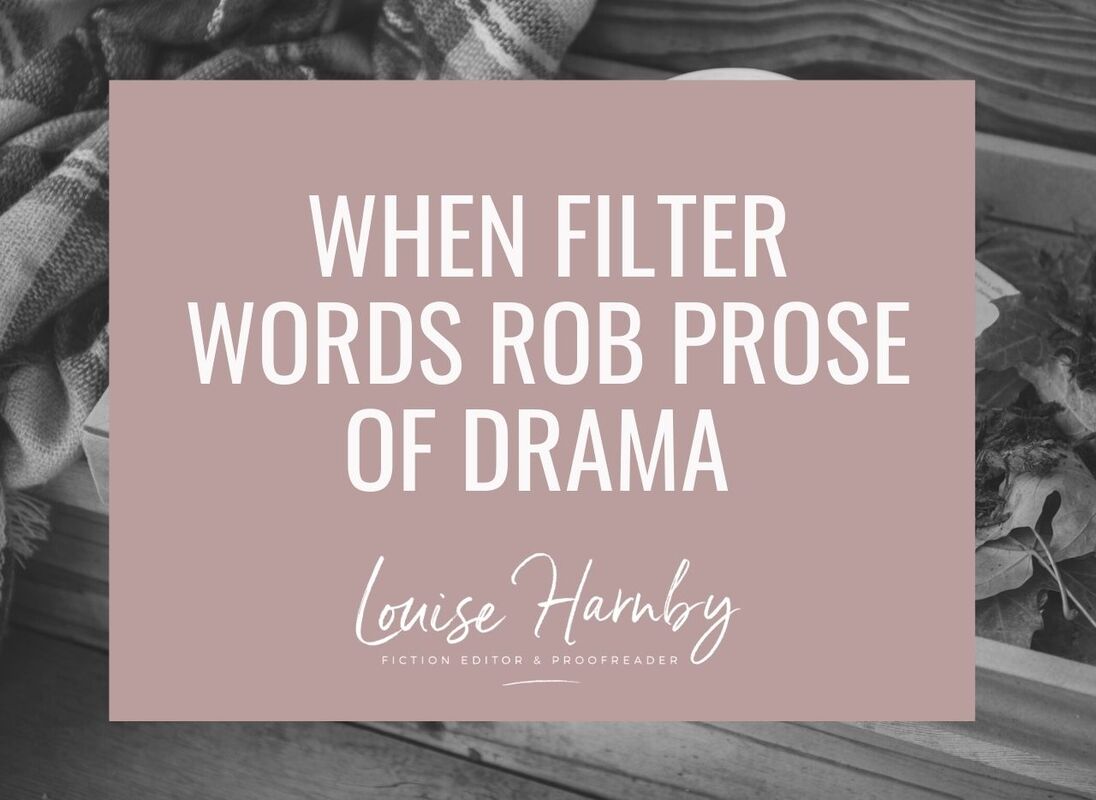|
If you’re looking for ways to inject some drama into your novel’s sentences, omitting filter words could be just the ticket. Do so judiciously though. Including them can add texture to mood and voice.
What are filter words?
Filter words are verbs that increase the narrative distance, reminding us that what we’re reading is being told by someone rather than experienced, or shown, through the eyes of the character. Examples include noticed, seemed, spotted, saw, realized, felt, thought, wondered, believed, knew, decided. I see more extensive filtering in books written by less experienced novelists who’ve not yet learned to trust their characters’ voices, who are uncomfortable about playing with devices such as free indirect style, or who are still learning the craft of injecting drama into narrative. I’ve taken some examples from published fiction and introduced filtering so you can see the difference, and how by avoiding filter words the writers have brought immediacy to their narratives:
When filter words distract
Filter words – particularly when they’re used as a narrative staple – tap the reader on the shoulder and say, ‘You’re not in this book. Someone else is experiencing this.’ They’re a reminder that doing is being done. Of course, we as readers know this to be true. Still, there’s nothing like immersing yourself in a character’s journey. Here’s an extreme example I made up:
John realized he needed to tell Marie. He’d wondered about how awful it would be. He’d long felt the weight of guilt bearing down on him, but now he’d decided it was time to let that go. He’d become aware that he’d fallen out of love with her months earlier and thought about what had gone wrong between them as soon as Mark had come into their lives.
He recalled their most recent argument and felt himself shudder. He’d looked on as she’d screamed abuse at him, seen the spittle fly from her mouth. He’d felt sadness at first but that had turned to fear when he’d seen her pick up a knife from the table. The text is horribly laboured – overly cluttered with doing being done. When confronted with a novel filled with filtering, readers will be tempted to skim, which means they might miss something crucial. A worst-case scenario is that they’ll give up because it’s not an enjoyable experience. Now let’s tighten it up by removing the filter words:
John was dreading telling Marie. The guilt had been eating him alive, but he was done with that. He’d fallen out of love with her months earlier, Mark’s entrance into their lives the trigger.
He shuddered, recalling their most recent argument. At first, there’d been only sadness as she screamed abuse at him, spittle flying from her mouth, but that had turned to fear when she’d reached for the knife on the table. We’ve lost none of the detail but now the prose is more emotionally immersive. We can better feel John’s predicament because we’re not repeatedly told that he’s doing the doing. It’s narration that feels less narrated. When filter words add texture I’m not suggesting you ban all filter words. When used intentionally they have a layering effect that can enrich a novel.
The Mackintosh example above is in first person. I think my filtered version works; it’s just different. Or perhaps it would be stronger with only one of the filters. Either way, one might argue that it imparts a deeper sense of the character’s scouring the envelope for clues. I still prefer Mackintosh’s approach because I like my crime fiction on the nose, but the experiment demonstrates that filter words aren’t wrong or right, but rather devices you can use to play with the reader’s experience of your story and the characters moving around within it. Here’s an example from Philip Prowse’s Hellyer’s Trip, p. 194:
Then the interrogation ceased. He knew he should have been scratching lines on the cell walls to mark the passing of time. But what was the point? He wasn’t the Count of effing Monte Cristo.
Prowse uses a filter word here: knew. He then follows through with free indirect style to close the narrative distance and take us right inside the character’s head while still maintaining a third-person viewpoint. So let’s look at what happens when we remove ‘He knew’.
Then the interrogation ceased. He should have been scratching lines on the cell walls to mark the passing of time. But what was the point? He wasn’t the Count of effing Monte Cristo.
I think the unfiltered version works very well but it does change the feel of the writing. Gone is the sense of deliberation. All four sentences are immediate. To my ear, the rhythm accelerates. And although there’s a feel of telling with the inclusion of ‘He knew’ in the published version, there’s also an increased sense of despondency, as if the character has had time to think this over and arrive at this knowledge. I mentioned character voice above. Here are two examples from Play Dead by David Rosenfelt:
When the movie is over, I realize I haven’t called Karen to ask if she can put me in touch with Keith Franklin. (p. 111)
Rosenfelt’s writing is tight. He never drops a beat. When he uses a filter word it’s with intention. Those who’ve read the Andy Carpenter series will know that this fictional attorney’s voice drips with a delicious acerbity, and the character thinks, acts and speaks with purpose. When we’re told he realizes something it’s because the author wants us to have a sense of dawning awareness, not because he couldn’t be bothered to cast the sentence in a way that avoided it.
I’m so pissed at Vince that I don’t talk to him for the twenty-minute ride to our destination. He spends most of the time whistling and listening to the Mets game; I don’t think my silent treatment is bringing him to his knees. (p. 163)
Most of the time, Rosenfelt avoids filter words: ‘I’m so pissed …’ not ‘I feel so pissed …’; ‘He spends most of the time …’ not ‘I listen to him …’. However, he chooses to tag ‘I don’t think’ onto the beginning of the final sentence rather than going with something like ‘My silent treatment isn’t bringing him to his knees.’ And, actually, the protagonist’s thinking is what deepens the voice and the immediacy. Summing up To keep your prose tight, look out for filter words that tell of doing being done. Then consider whether a gentle recast without them will improve your prose. How does the revised text make you feel? Is the meaning still clear? Is the mood you’re seeking evident? If the prose feels more dramatic and immersive, you’ve done your novel and your readers a favour. If you lose something in the revision, like voice, mood or intention, reintroduce your filters at the appropriate points.
Louise Harnby is a line editor, copyeditor and proofreader who specializes in working with crime, mystery, suspense and thriller writers.
She is an Advanced Professional Member of the Chartered Institute of Editing and Proofreading (CIEP), a member of ACES, a Partner Member of The Alliance of Independent Authors (ALLi), and co-hosts The Editing Podcast. Visit her business website at Louise Harnby | Fiction Editor & Proofreader, say hello on Twitter at @LouiseHarnby, connect via Facebook and LinkedIn, and check out her books and courses.
14 Comments
Robbie Cheadle
9/5/2019 05:46:11 am
A most helpful article.
Reply
Louise Harnby
9/5/2019 02:05:15 pm
Thanks, Robbie!
Reply
9/5/2019 12:05:28 pm
Most interesting. I spend quite a bit of time trying to get rid of filler words. This is a different way of looking at them. We keep being given 'rules', but they change as fashion changes. Reading many older books, the rules seem to be different. Passive voice was not a terrible thing for example. (I'm thinking some of the classics here.)
Reply
Louise Harnby
9/5/2019 02:04:50 pm
I think that's the problem! I don't think 'rules' aren't the right way to approach creative writing. They're too prescriptive. Fiction authors aren't writing academic textbooks; they trying to convey emotion, and tell a story. For me it's about intent and effect. When I'm editing, I remove filter words that clutter and distract. But when they do add meaning, they can stay.
Reply
Lindsey Russell
10/5/2019 12:45:02 am
'He recalled their most recent argument and felt himself shudder.'
Reply
Louise Harnby
10/5/2019 11:44:52 am
When I was creating the reworked version of that example, I slipped one in inadvertently. My editor spotted it! As you say, they have a habit of sneaking past us [said Louise, feeling herself tremble at the thought of missing a filter word!] LOL!
Reply
8/1/2020 10:24:36 pm
It really annoys me when, in the name of axing head-hopping, the author writes something like he felt himself smile. I just want to scream when I see that, and yell, "Doesn't the bloke have facial muscles? Is he on Botox that he has to feel himself smile? Smile already!"
Reply
cheryl oneill
9/7/2020 02:30:36 pm
Beautiful clarification of filter words.
Reply
Louise Harnby
9/7/2020 11:15:37 pm
Thank you, Cheryl!
Reply
Jo Speirs
27/10/2020 11:01:52 pm
Hello, Louise,
Reply
Louise Harnby
28/10/2020 11:04:20 am
I'd be more likely to frame it as follows, Jo: Removing filter words shortens the narrative distance. When a writer says 'he/she/they saw' for example, it's often that they're trying to write a 3rd person limited POV, but the filter words widen the distance, with the outcome that the POV doesn't feel as deep as it might.
Reply
27/12/2020 09:54:53 pm
I'm editing a story and needed a refresher in filter words. Thanks so much for supporting writers.
Reply
Louise Harnby
30/12/2020 11:10:44 am
You're very welcome, Dare!
Reply
5/3/2021 04:21:52 pm
Thank for this helpful article. I find I overuse feel and felt and believe and think. Doing a search for these filter words humbles me during editing, but it does make my writing stronger. Now you've given me another way to look them, with intentionality. What purpose are they serving? Thanks again.
Reply
Leave a Reply. |
BLOG ALERTSIf you'd like me to email you when a new blog post is available, sign up for blog alerts!
TESTIMONIALSDare Rogers'Louise uses her expertise to hone a story until it's razor sharp, while still allowing the author’s voice to remain dominant.'Jeff Carson'I wholeheartedly recommend her services ... Just don’t hire her when I need her.'J B Turner'Sincere thanks for a beautiful and elegant piece of work. First class.'Ayshe Gemedzhy'What makes her stand out and shine is her ability to immerse herself in your story.'Salt Publishing'A million thanks – your mark-up is perfect, as always.'CATEGORIES
All
ARCHIVES
July 2024
|
|
|
|

















 RSS Feed
RSS Feed





